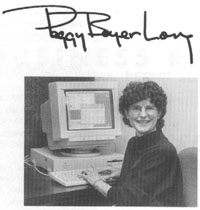
EDITOR'S NOTEBOOK

Writer argues the world has plenty of food, but not enough political will
by Peggy Boyer Long
Reporter Bill Lambrecht tracks advances in biotechnology across the globe, but his ground-breaking expeditions at the frontiers of science and farming keep this native Illinoisan rooted in the agricultural Midwest. At least in spirit.
Lambrecht, a Washington. D.C-based political and environmental writer for the St. Louis Post-Dispatch, has traveled to four continents, some dozen countries in all, to explore the world's responses to genetically engineered foods and crops.
He took a bus, crossing the Andes above the cloud forest, to get to the Ecuadorian jungles, where he caught up wish bioprospectors mining genes for U.S. grains. He discovered a conflict between corporations and indigenous people over control of plant resources. I He trekked to India, where hundreds of farmers killed themselves by drinking pesticides. There were 500 suicides in a single year in Warangal, where despairing families are sinking into debt and "dishonor" because the chemicals can no longer stop the boll worms that are eating their livelihoods. "That made me understand there could be room for technology in developing countries," But when he waded into a demonstration near Oxford in England as hundreds in ghostly while suits yanked crops from the earth, he was reminded how deep fears about scientific manipulation of food sources can run.
We're reminded of how fortunate we are that he's agreed to pass some of these observations along to our readers — while, we jokingly suggest, he's on break from that tough assignment chatting up French farmers in Paris cafes. Lambrecht's first analysis of biogenetics for the magazine appeared last November, His latest assessment appears this month on page 12.
Bill Lambrecht is a natural for this complex story. St. Louis, of course, is home-base to Monsanto Co., a world leader in this emerging technology. More important, Lambrecht has covered the environment since his days as a political reporter at the Illinois Capitol. In the mid-'70s, he wrote about nuclear power and developments in the coal industry, covering the state's energy program for Illinois Issues' first edition. And. he likes to recall, he wrote about "the first time in America men in Moon suits" showed up at a toxic waste dump. That was in Wilsonville, south of Springfield.
He launched his reporting on biogenetics in the mid-'80s with stories about bovine growth hormone, developed by Monsanto for the first commercial application of bioengineering. He turned his attention to Illinois in the late 1980s, when some of the first outdoor genetic crop experiments in the country were conducted in the Jerseyville area.
Lambrecht has won national awards for reporting on exports of hazardous wastes to developing nations and illegal dumping on American Indian lands. Last spring, he won one for his stories on biogenetics.
We asked where he thinks this volatile issue is going. Congress, he suggests, will have to decide whether or not to require labeling on modified crops, as some European nations are demanding, On whether to modify the crops at all:
"There will be a public debate that arguably didn't take place during the breathtaking development of this technology." Corporations already are beginning to worry about dwindling markets. "When [Decatur-based] ADM said it would pay a premium price for nonmodified soybeans, that was a signal." Future genetic modifications, perhaps to reduce fats, will be designed, he says, to overcome consumer ambivalence. "Globally, we'll continue to see a robust debate in the democracies on this technology. Because the technology has so much power."
Does he have any advice for Illinois farmers? "They need," he suggests, "to be alert to what's happening globally with this technology. And they need to be aware of the consolidation in the agriculture industry and decide what's healthy, what's not and what works for them." But the world, he argues, grows plenty of food. "So much of the hunger in the world is a failure of distribution. and everybody knows that. It's a matter of political will rather than science."
4 September 1999 Illinois Issues